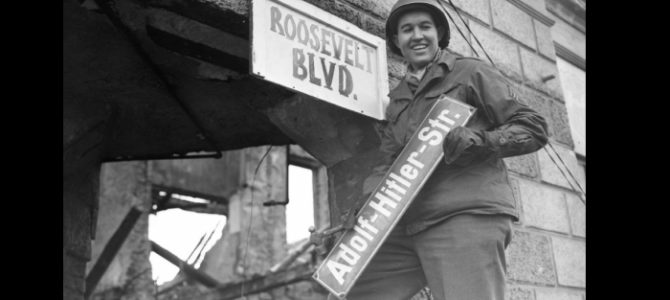Geoff Vasil
In December the Lithuanian news outlet 15min.lt treated its readers to the strange spectacle of a Lithuanian defense against American and Allied accusations of the collective guilt of average Germans in the crime of genocide against the Jewish people.
“‘Nonetheless, too many people tried not to see what was happening.’ German president Richard von Weizsäcker said these words on May 8, 1985, at a commemoration of the 40th anniversary of the end of World War II.
“…The Belarussian opposition website zerkalo.io tells how Germans suffered de-Nazification and tried to come to terms with the past. ‘This town is guilty!’ Many have heard of the process known as de-Nazification. The Allies who won World War II (USA, Great Britain, France and the Soviet Union) began the process of de-Nazification.”
Full text in Lithuanian here.
Norbertas Černiauskas delivered what was apparently an account of Lithuanian history wars in Lithuania in 2021 on Lithuanian national radio, saying:
“Summing up the abundance of events at the end of the year, we can remember as well news from the fronts of history and memory.
“A continuing scandal at the Center for the Study of the Genocide and Resistance of Residents of Lithuania began this year. We can characterize everything which went on at the Center for almost half a year as an attempt to exploit memory and to ideologize history research for narrow political interests. We need to take joy in the fact this politicized invasion of the Center and the field of historical memory was stopped in the Lithuanian parliament, and historians opposed it.
“In the summer we marked the 80th anniversary of the beginning of the horrific and not always clear historical events of 1941: the first deportation, the anti-Soviet uprising, the beginning of the Holocaust. Before this anniversary there were fears on what to emphasize in commemorations and there were different discussions in the media, commentaries by experts and of how much manipulation, anti-Semitism and Kremlinism would make it into the public space.”
Kremlinism? Maybe it sounded cool at the time on live radio. Černiauskas’s “analysis” of the the Center for the Study of the Genocide and Resistance of Residents of Lithuania is sorely lacking: the Center didn’t somehow become “politicized” under Adas Jakubauskas, the director appoint by the Lithuanian conservatives. Its mission from its very foundation has been very clearly aimed at “ideologizing” history and presenting a sanitized version of the Holocaust for Lithuanian consumption, something every Center director from Kuodytė through Burauskaitė to the present has understood and undertaken. Černiauskas’s phrase “and not always clear historical events of 1941” is code for honoring Lithuania’s officially schizophrenic historical narrative positing Nazi lackeys as national patriots. Certainly there is some public confusion about celebrating the rise of the LAF in 1941 and at the exact same time mourning the beginning of the Holocaust the LAF began in 1941. Full text in Lithuanian of the radio broadcast here.
15min.lt continued their strange crusade with an extremely convoluted article refuting exploitation by unspecified parties of a speech made by Auschwitz survivor Marian Turski and misquotations of that speech by those opposed to vaccinations and gene therapies for corona virus:
“The social media are spreading an extremely cynical lie. Opponents of vaccinations are sharing a speech by Holocaust survivor Marian Turski and intentionally distorting its context. The commemoration of the 75th anniversary of the liberation of the Auschwitz concentration camp took place last year.”
Full text in Lithuanian here.


